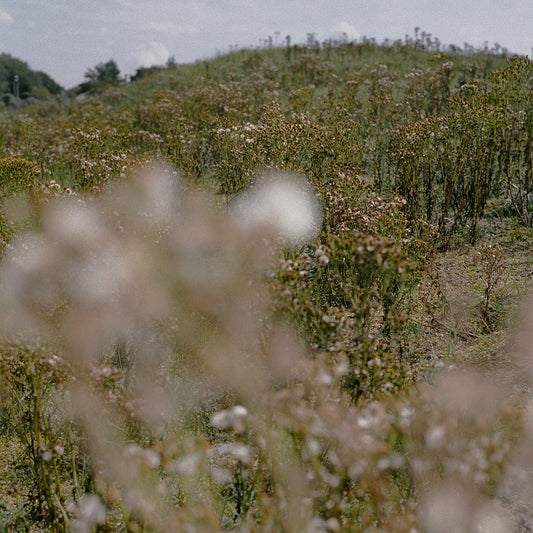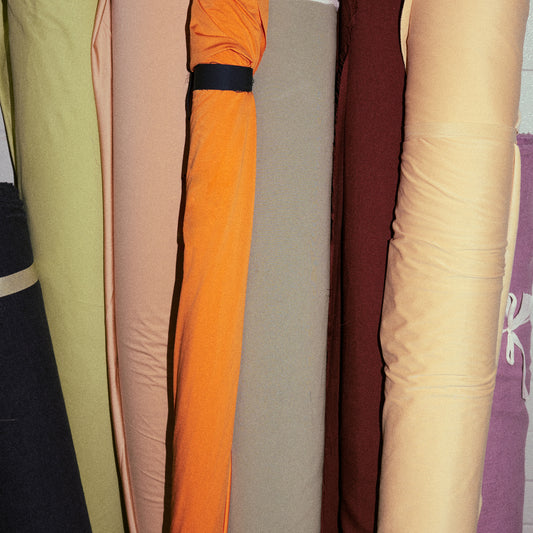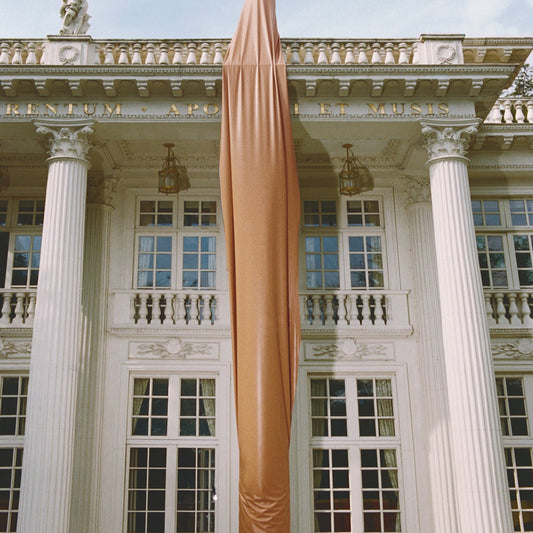Circular fashion
Moving to a circular business model is essential, as it allows the industry to decouple economic growth from the use of natural resources. Our aim is to be on the frontline of this movement, adopting existing solutions and proactively creating new ones. Circularity is based on three principles: reducing or designing out waste and pollution; keeping products and materials in use; and regenerating natural systems. Since 2020 we have been active in improving our circular practices through our material choices, while supporting the development of new business models, processes and services which can extend the life cycle of our garments.
Circular materials
Created in 2019, our deadstock fabric library is regularly updated and reviewed by our Design team, who now use deadstock materials for collections as well as sampling. This is supported by our Merchandising team, who select materials for potential reproduction and production from remaining materials, enabling us to reduce waste generation and keep materials in loop for longer.
In 2022, around 19% of the materials used in our collections came from what we define as circular materials, which means materials that have a recycled content or materials that have been repurposed. 17% of the fabrics used were made from recycled fibers (compared to 11% in 2021 and 2% in 2020), and 2% were sourced from our deadstock (compared to 2% in 2021 and 0.8% in 2020).
Share of recycled and upcycled materials used in 2022 [based on weight]

Rent, repair, re-use
We consider new business models a tool to foster more conscious customer behavior, and we recognise our responsibility to embrace and support the shift from how fashion is consumed to how it’s loved.
To extend the lifecycle of a garment and ensure it is enjoyed for as long as possible, we offer an in-store repair service beyond the six-month warranty period for all of our items. We also mend every repairable item in our inventory by including a repair pack with each delivery to our stores, including buttons, linings and other trims, avoiding additional shipments to manufacturers. If a garment cannot be repaired, it is either upcycled through collaborations with universities, remanufactured, or recycled.
Considering innovative ways to repurpose and reimagine upcycled fabrics is just one way in which we are exploring more responsible manufacturing at Nanushka. In November 2022, we launched ANEW:22 (following the success of ANEW:21), a collection of pieces from the Nanushka archive, reinterpreted entirely in deadstock fabrics launched exclusively on Nanushka.com. More affordable than our regular collections, it allowed us to share the spirit of Nanushka with a broader audience.
Our progress
Resale
We are continuing to collaborate with TheRealReal to lengthen product life cycles by supporting customers’ second-hand consignments in the US, and we are working to launch a white-label solution.
Rental
We are partnering with the US platform Rent The Runway to allow some of our bestselling items to be rented.
Collection
As part of our efforts to avoid sending any of our materials and products to landfill, in 2022 we decided to partner with SCRAP NYC for some of our faulty items beyond repair (around 80 pieces, including post-consumer collection). Established in 2020, SCRAP’s network of collection, sorting, sanitizing, reselling, and fiber recycling partners allows brands to responsibly keep items in circulation.
Packaging
Packaging has a significant impact throughout the fashion supply chain, both from a circularity perspective and the GHG emissions it generates. For cellulose-based packaging, we have increased the use of FSC certified materials, reaching more than 99% (compared to 60% in 2021 and 3% in 2020), in line with our Canopy commitment to source 100% responsibly-sourced cellulose based packaging by the end of 2022.
Since FW21, we introduced recycled polybags and TIPA home compostable packaging - which decreases plastic pollution when compared with recycled or other recyclable packaging solutions. We use exclusively recycled plastic transit hangers and we switched our desiccant bags from silica gel to bentonite clay, which is an alternative produced without the use of chemicals and water.
We’re also proud of continuing our partnership with RePack, begun in October 2020, to offer a reusable and returnable packaging alternative made from recycled materials. Our latest data shows that the mix of RePack packaging used for shipping from our online store has increased from 6% in 2020, to 11% in 2021, to 18% in 2022, which means that more customers are now selecting this circular option to have their products delivered at home.
Split of packaging materials used in 2022
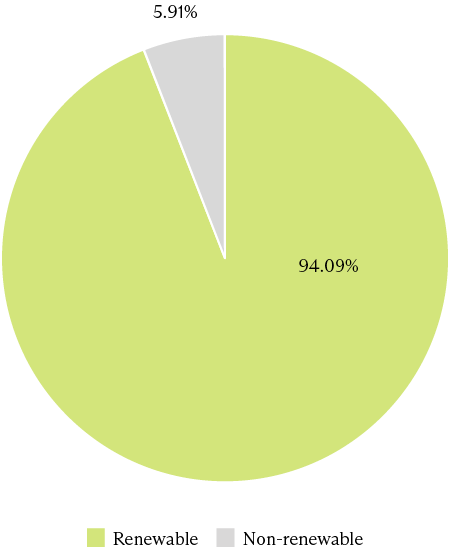
Split of cellulose-based packaging used in 2022
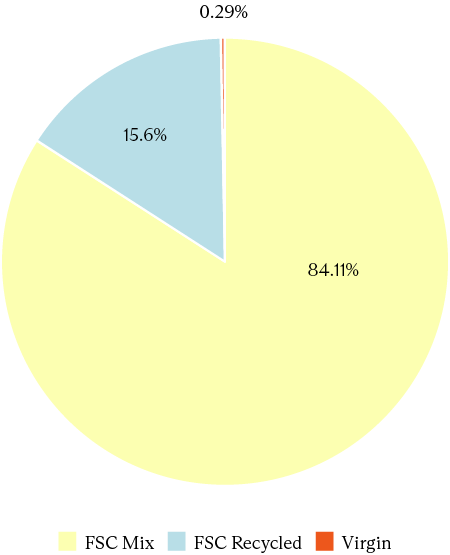
Connected products
In December 2020, Nanushka launched its first digital connected products as part of the RS21 collection, and we have continued to add digital identities to items ever since. Launched in partnership with the New York-based product cloud platform EON, Digital IDs are virtual certificates that can be used to record each item’s history, allowing customers to have access to unique information, content and services.
Customers shopping for products with Digital IDs are able to scan the discrete QR Code sewn into selected items of the collection, thereby gaining access to detailed product composition, provenance and design information, as well as expert styling tips and care instructions that ensure the pieces can be treasured for years to come. Furthermore, Digital ID technology allows for instant authentication and traceability should you choose to expand the life cycle of your product by passing it on to a new owner, helping us to change the consumer mindset toward second-hand goods and luxury resale.
Since the launch of the campaign for our RS21 collection, Digital IDs have been included on 2,989 styles (for a total of 149,620 items).
In 2022, Nanushka has also been honored to exhibit one of its Symbol key styles in the Fashion for Good Museum in Amsterdam to showcase our Digital IDs. The Museum aims to inspire change and drive the collective movement to make fashion a force for good. Due to the great success of the initiative, we have been asked to extend the loan for another year, so that more people visiting the Tech Hub will have the chance to learn more about Nanushka and its responsible practices.
Discover More
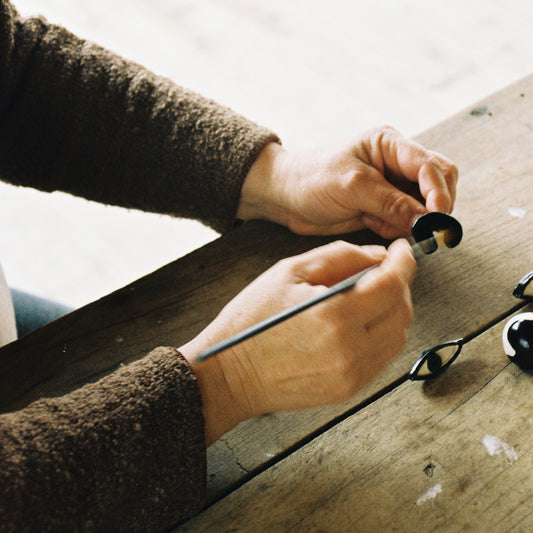
Repair, Rent, Recycle
Embracing a new fashion model“Sustainable fashion is an oxymoron unless the business model changes,” asserts Natasha Franck, Founder & CEO of digital ID platform Eon.
Repair, Rent, Recycle
Embracing a new fashion model“Sustainable fashion is an oxymoron unless the business model changes,” asserts Natasha Franck, Founder & CEO of digital ID platform Eon.

Carbon Footprint
The fashion industry has a significant impact on climate change, and as a luxury fashion brand, Nanushka is embarking on a path to decarbonization in line with industry best practices....
Carbon Footprint
The fashion industry has a significant impact on climate change, and as a luxury fashion brand, Nanushka is embarking on a path to decarbonization in line with industry best practices....



